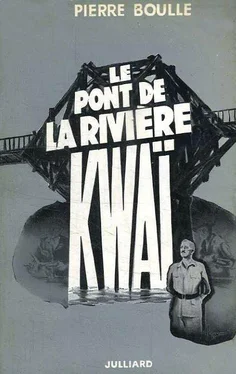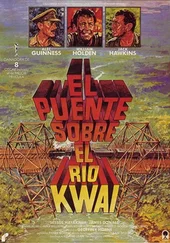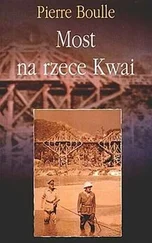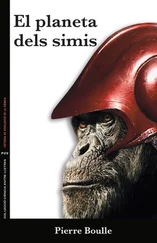One evening the three of them were studying a map which Joyce had just pinned up on the bamboo wall.
“Here’s the approximate course of the railway, sir,” he said. “The reports seem to tally pretty well.”
Joyce, who was an industrial designer in civilian life, had been detailed to keep a large-scale map marked with all the intelligence available on the Burma-Siam railway.
There was plenty of information. During the month since they had safely landed on their selected dropping zone they had succeeded in winning the friendship of the local population over a wide area. They had been received by the Siamese agents, and been housed in this little hamlet inhabited by hunters and smugglers and hidden away in a corner of the jungle well away from the nearest line of communication. The natives hated the Japanese. Shears, who was trained to take nothing for granted, had gradually been convinced of the loyalty of his hosts.
The first part of their mission was successfully under way. They had secretly established contact with several village headsmen. Volunteers were ready to rally round them. The three officers had started instructing them and were now training them in the use of the weapons employed by Force 316. The most important of these was “plastic,” a soft brown paste as malleable as clay, in which several generations of chemists in the Western world had patiently contrived to amalgamate the best features of every known explosive and several others besides.
“There are any amount of bridges, sir,” Joyce went on, “but if you ask me, most of them aren’t up to much. Here’s the list, from Bangkok right up to Rangoon, complete as far as our information goes.”
The “sir” was for the benefit of Major Shears, his “Number One.” Although discipline was strict in Force 316, such formality was nevertheless not usual among members of a special mission; and Shears had asked Joyce several times to stop calling him “sir.” He had not been able to break him of the habit—a prewar habit, Shears imagined, which made the young man cling to this mode of address.
Yet so far Shears could find nothing but praise for Joyce, whom he had selected from the Calcutta school on the instructors’ reports as well as on the candidate’s physical appearance, but most of all on his own instinctive judgment.
The reports were good and the comments flattering. Young Joyce, it seemed, who was a volunteer like all the other members of Force 316, had always given complete satisfaction and had shown exceptional keenness on every part of the course—which was something to be said for him, in Shears’s opinion. According to his personal file, he had been a draftsman on the staff of a big industrial and commercial concern—probably only a minor employee. But Shears had not inquired any further. He felt there was no profession that could not eventually lead to the Plastic and Destructions Company, Ltd., and that a man’s prewar career was his own business.
On the other hand, all Joyce’s visible qualities would not have been sufficient to warrant Shears’s taking him in as the third member of the team if they had not been backed up by others which were less easy to define and for which he relied on little else but his own personal impression. He had known volunteers who were excellent during training, but whose nerve failed them when it came to certain duties demanded by Force 316. He did not hold this against them. Shears had his own ideas on this subject.
He had therefore sent for this future companion of his in order to try and find out what sort of man he was. He had asked his friend Warden to be present at the interview, for the professor’s advice in a selection of this sort was always worth considering. He had been favorably impressed by Joyce’s appearance. His physical strength was probably not much above the average, but he was fit, and seemed a well-balanced type. His clear, frank answers to the questions he was asked showed he had a practical mind, that he never lost sight of his objective, and was well aware of what he was letting himself in for. Apart from this, his keenness showed unmistakably in his eyes. He was obviously dying to accompany the two veterans ever since he had heard the rumor of a dangerous mission being planned.
Shears had then brought up a point which he considered important, as indeed it was.
“Do you think you’d be capable of using a weapon like this?” he had asked.
He had shown him a razor-sharp dagger. This knife was part of the kit which members of Force 316 took in with them on every special mission. Joyce had not batted an eyelid. He had replied that he had been taught how to handle the weapon and that the course included practicing with it on dummies. Shears had repeated the question.
“That’s not exactly what I meant. What I want to know is: are you quite sure that you’d be really ‘capable’ of using it in cold blood? Lots of men know how to use it, but aren’t able to when it comes to the point.”
Joyce had understood. He had silently thought the matter over, then solemnly replied:
“That’s a question I’ve often asked myself, sir.”
“A question you’ve often asked yourself?” Shears had repeated, looking at him closely.
“Yes, sir, really. And I must admit, it’s worried me quite a lot. I’ve tried to imagine myself ”
“And what was the answer?”
Joyce had hesitated, but only for a second.
“Speaking quite frankly, sir, I don’t think I’d disappoint you if it ever came to the point. I don’t honestly. But I couldn’t say for certain. I’d do my very best, sir.”
“You’ve never had a chance of using one of these in anger, is that it?”
“That’s it, sir. My job never called for that sort of thing,” Joyce had replied, as though offering an apology.
He seemed to be so genuinely sorry about it that Shears could not help smiling. Warden had immediately joined the conversation:
“I say, Shears, this chap seems to think that my old job, for instance, is a special qualification for this sort of work. A professor of Oriental languages! And what about you—a cavalry officer!”
“I didn’t mean that exactly, sir,” Joyce had stammered in his embarrassment.
“Ours is the only firm I know,” Shears had philosophically concluded, “in which you’d find, as you say, an Oxford graduate and an ex-cavalryman doing this particular sort of work— so why not an industrial designer as well?”
“Take him,” was all the Warden said when asked for his advice as soon as the interview was over. Shears had done so. Thinking it over, he had been fairly pleased with the candidate’s answers. He was just as suspicious of men who overestimated themselves as of those who underestimated. The sort he liked were those who were capable of distinguishing the tricky part of a mission in advance, who had sufficient foresight to prepare for it, and enough imagination to see it quite clearly in their mind’s eye—so long as they did not let it become an obsession. So from the start he had been satisfied with his team. As for Warden, he had known him for a long time and knew exactly how far he was “capable.”
They pored over the map for some time, while Joyce pointed out the bridges and described the particular features of each. Shears and Warden listened carefully with curiously tense expressions, although they already knew the hopeful officer’s report by heart. Bridges always provoked a passionate interest in every member of the Plastic and Destructions Co., an interest of an almost mystical nature.
“These are just footbridges you’re describing, Joyce,” said Shears. “Don’t forget, we want a really worth-while target.”
“I only mentioned them, sir, in order to refresh my memory. As far as I can see, there are only three worth bothering about.”
Читать дальше











